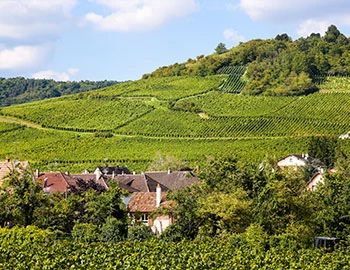
Châteauneuf-du-Pape Pégau Laurence 2019
AC Châteauneuf-du-Pape, Laurence Féraud, 750 ml

| Grape variety: | Grenache, Mourvèdre, Syrah, Counoise |
| Producer: | Domaine de Pégau / Fam. Féraud |
| Origin: | France / Rhône / Châteauneuf-du-Pape |
Counoise
Crisp, rare and elegant
This sparsely-stocked red grape spawns astonishingly crisp wines. It is cultivated in small quantities in the southern Rhône Valley and the Languedoc. However, it originated in Spain. Legend has it that Pope Urban V (1310-1370), the penultimate Avignon Pope, received a vine as a gift from a Spaniard named Counesa.
This variety matures late, with weak productivity; its high quality makes up for it, though. In total, nearly 1,000 hectares are planted with Counoise in France. Wines pressed from the Counoise grape are mostly light in color, elegant, multi-layered, and fruity.
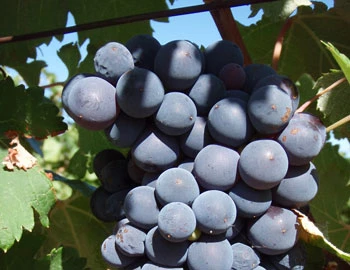
Syrah
A hint of pepper
The legend stubbornly persists that the Syrah variety came from the Persian city of Shiraz. Yet, researchers have shown that it is a natural crossing of two old French varieties: the red Dureza from the Rhône Valley and the white Mondeuse blanche from Savoy. Wines from Syrah are gentle and concentrated. They smell of dark berries, violets and liquorice, and amaze with a piquant touch of white pepper. As varietal wines, they are found on the northern Rhone, as in the Hermitage or Côte Rôtie appellations, as well as in Swiss Valais. In the southern Rhône Valley, Syrah is often wedded with Grenache and Mourvèdre. In 1832, a Frenchman brought the variety to Australia, where it became the emblem of the national wine industry. There, the weightiest versions develop with typical notes of tar and chocolate.
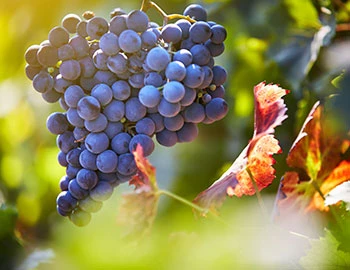
Grenache
Grenache seldom comes alone
Spaniards and Sardinians make the Grenache contentious: both claim it originated from their country. In fact, it had already appeared in both places by the 16th century. But a large number of mutations in Spain indicates that it has deeper roots on the Iberian Peninsula. The Grenache is meaty and spicy, with a wonderful, fruity sweetness and rich aromas of blackberry, cassis, plums and pepper. Under the name Garnacha, it contributes fullness to the Rioja. In Sardinia it is called Cannonau, where it yields strong, expressive wines. But its stronghold is in France. Grenache is the star in Châteauneuf-du-Pape and streams into many other assemblages from the south. Its preferred partners are Syrah and Mourvèdre. This blend is also very popular abroad. In Australia, these wines are simply called "GSM".
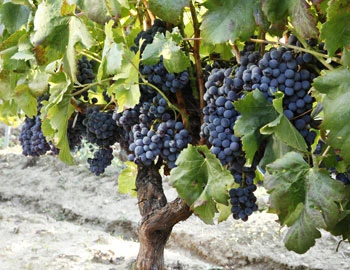
Mourvèdre
Hot-blooded Spaniard
It cannot be hot enough for the Monastrell grape. It grows around the Mediterranean, where the summers are long and hot and the winters mild. At only 200 metres in elevation, or 80 kilometres from the coast, its grapes have problems ripening. It was likely born in the Valencia region. According to written records, it was already counted among the most important varieties in 1460. Its exact origin is thought to be the Camp de Morvedre area. From there, it migrated in the 17th century to Provence, where it was christened Mourvèdre. Its wines are deeply dark, with intense blackberry aromas, rich tannins and moderate acidity. They enter into the most beautiful harmonies with other varieties from the south, such as Garnacha, Carignan or Syrah. The Mourvèdre is the main ingredient of red wines of Bandol; it also flows into the Châteauneuf-du-Pape. On the Spanish Levante coast, it is also pressed solo.
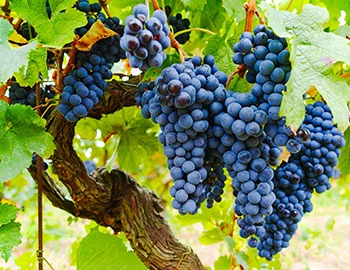
Rhône
Rhône: northern power, southern charm
The Rhône’s source is in Valais, and it flows into the Mediterranean 800 kilometres to the south. In the last 200 kilometres of its course, it is lined with vines which yield a range of red crus that are among the most prestigious wines in the world – for example, on the spectacular cliffs of the Hermitage Mountains, or in the gravelly terraces of Châteauneuf-du-Pape. The river valley, however, is also a rich source of characterful white wines and affordable, high-quality, everyday red wines.
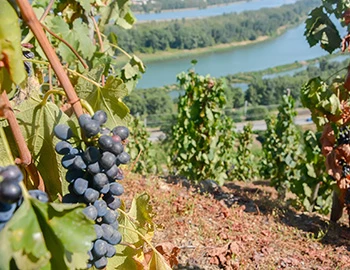
France
France – Philosophy in a bottle
According to French philosophy, wine should be an expression of the soil and climate. They use the word “terroir” to describe this. Terroir makes every wine different, and many especially good. French wine is regarded worldwide as an expression of cultural perfection. The French believe that humans are responsible for the quality of the berries, the vine variety for their character, and nature for the quantity. This philosophy can be expressed succinctly as: “the truth is the vineyard, not the man.”
